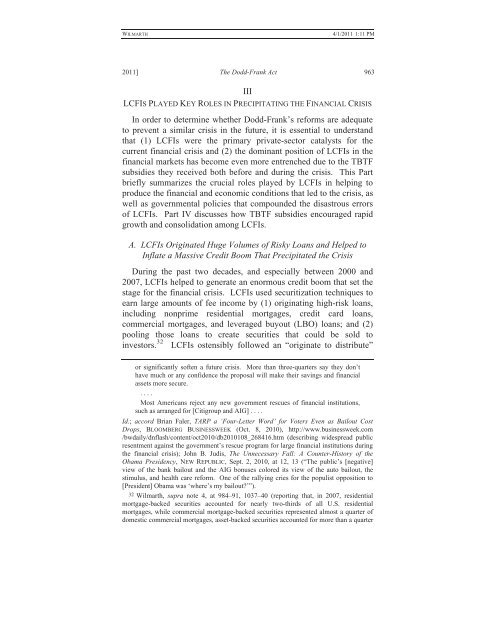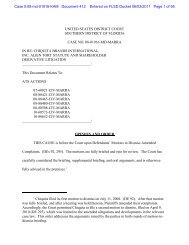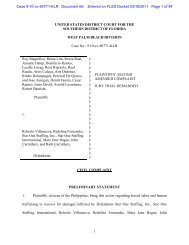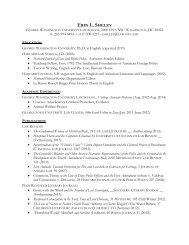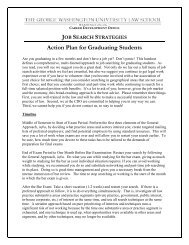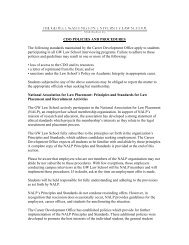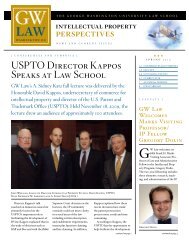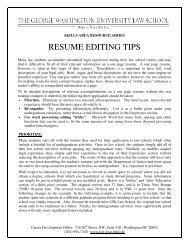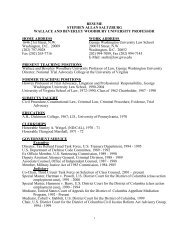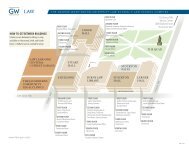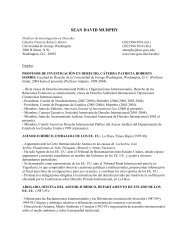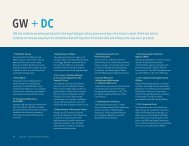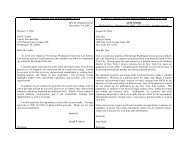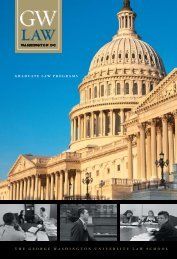CLE Materials for Panel #1 - George Washington University Law ...
CLE Materials for Panel #1 - George Washington University Law ...
CLE Materials for Panel #1 - George Washington University Law ...
Create successful ePaper yourself
Turn your PDF publications into a flip-book with our unique Google optimized e-Paper software.
WILMARTH<br />
4/1/2011 1:11 PM<br />
2011] The Dodd-Frank Act 963<br />
III<br />
LCFIS PLAYED KEY ROLES IN PRECIPITATING THE FINANCIAL CRISIS<br />
In order to determine whether Dodd-Frank’s re<strong>for</strong>ms are adequate<br />
to prevent a similar crisis in the future, it is essential to understand<br />
that (1) LCFIs were the primary private-sector catalysts <strong>for</strong> the<br />
current financial crisis and (2) the dominant position of LCFIs in the<br />
financial markets has become even more entrenched due to the TBTF<br />
subsidies they received both be<strong>for</strong>e and during the crisis. This Part<br />
briefly summarizes the crucial roles played by LCFIs in helping to<br />
produce the financial and economic conditions that led to the crisis, as<br />
well as governmental policies that compounded the disastrous errors<br />
of LCFIs. Part IV discusses how TBTF subsidies encouraged rapid<br />
growth and consolidation among LCFIs.<br />
A. LCFIs Originated Huge Volumes of Risky Loans and Helped to<br />
Inflate a Massive Credit Boom That Precipitated the Crisis<br />
During the past two decades, and especially between 2000 and<br />
2007, LCFIs helped to generate an enormous credit boom that set the<br />
stage <strong>for</strong> the financial crisis. LCFIs used securitization techniques to<br />
earn large amounts of fee income by (1) originating high-risk loans,<br />
including nonprime residential mortgages, credit card loans,<br />
commercial mortgages, and leveraged buyout (LBO) loans; and (2)<br />
pooling those loans to create securities that could be sold to<br />
investors. 32 LCFIs ostensibly followed an “originate to distribute”<br />
or significantly soften a future crisis. More than three-quarters say they don’t<br />
have much or any confidence the proposal will make their savings and financial<br />
assets more secure.<br />
. . . .<br />
Most Americans reject any new government rescues of financial institutions,<br />
such as arranged <strong>for</strong> [Citigroup and AIG] . . . .<br />
Id.; accord Brian Faler, TARP a ‘Four-Letter Word’ <strong>for</strong> Voters Even as Bailout Cost<br />
Drops, BLOOMBERG BUSINESSWEEK (Oct. 8, 2010), http://www.businessweek.com<br />
/bwdaily/dnflash/content/oct2010/db2010108_268416.htm (describing widespread public<br />
resentment against the government’s rescue program <strong>for</strong> large financial institutions during<br />
the financial crisis); John B. Judis, The Unnecessary Fall: A Counter-History of the<br />
Obama Presidency, NEW REPUBLIC, Sept. 2, 2010, at 12, 13 (“The public’s [negative]<br />
view of the bank bailout and the AIG bonuses colored its view of the auto bailout, the<br />
stimulus, and health care re<strong>for</strong>m. One of the rallying cries <strong>for</strong> the populist opposition to<br />
[President] Obama was ‘where’s my bailout?’”).<br />
32 Wilmarth, supra note 4, at 984–91, 1037–40 (reporting that, in 2007, residential<br />
mortgage-backed securities accounted <strong>for</strong> nearly two-thirds of all U.S. residential<br />
mortgages, while commercial mortgage-backed securities represented almost a quarter of<br />
domestic commercial mortgages, asset-backed securities accounted <strong>for</strong> more than a quarter


